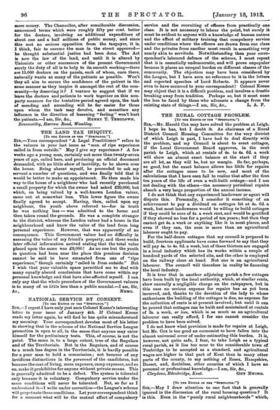NATIONAL SERVICE BY CONSENT.
[To THE EDITOR OF THE "SPECTATOR."J Sin,—I regret I have only just seen Colonel Keene's interesting letter in your issue of January 4th. If Colonel Keene reads my letter again, he will find he has quite misunderstood my meaning. Your correspondent devotes most of his letter to showing that in the scheme of the National Service League promotion is open to all, in the sense that anyone may enter himself for the preliminary tests. This, of course, is not the point. The same is, to a large extent, true of the Regulars and of the Territorials. But in the Regulars, and of course to a much less degree in the Territorials, it is hardly possible for a poor man to hold a commission ; not because of any invidious distinctions in the personnel of the candidates, but because the cost of living, mess expenses, camp expenses, and so on, make it prohibitive for anyone without private means. This is generally admitted to be a defect. The system is tolerated only because it is voluntary. Compulsory service under the same conditions will never be tolerated. But, so far as I understand it—I write under correction—the League's scheme will perpetuate these conditions. Let your correspondent think for a moment what will be the mutual effect of compulsory
service and the recruiting of officers from practically one class. It is not necessary to labour the point, but surely it must be evident to anyone with a knowledge of human nature and the effect of military training that compulsory service under conditions where the officers are drawn from one class and the privates from another must result in something very nearly akin to servitude. Notwithstanding then your correspondent's laboured defence of the scheme, I must repeat that it is essentially undemocratic, and will prove unpopular because it places an unequal burden on different classes of the community. The objection may have been considered by the League, but I have seen no reference to it in the letters and reported speeches of Lord Roberts. It appears never even to have occurred to your correspondent! Colonel Keene may object that it is a difficult problem, and involves a drastic breaking away from tradition. Perhaps so, but it must none the less be faced by those who advocate a change from the existing state of things.—I am, Sir, &c., L. A. F.






































 Previous page
Previous page